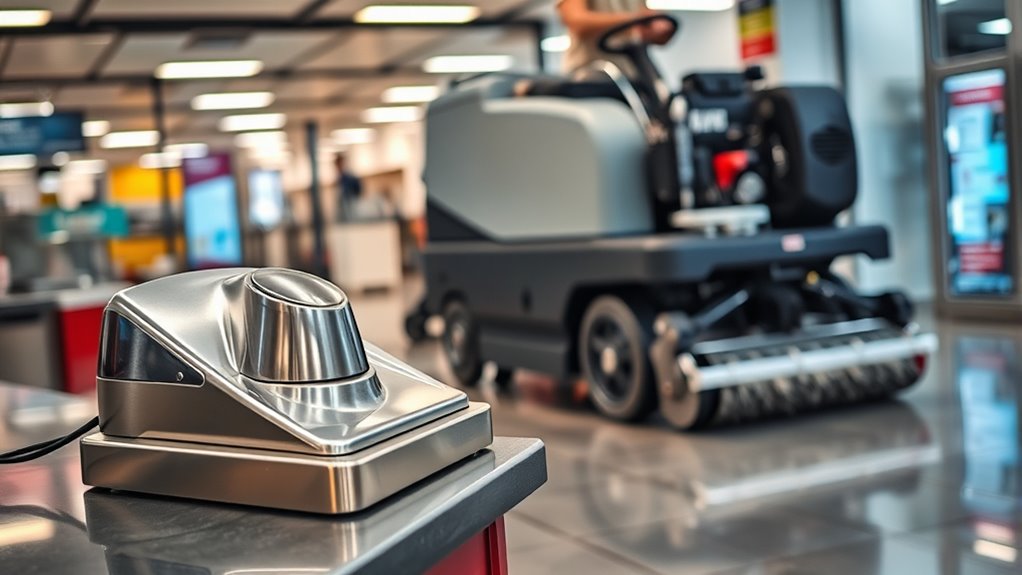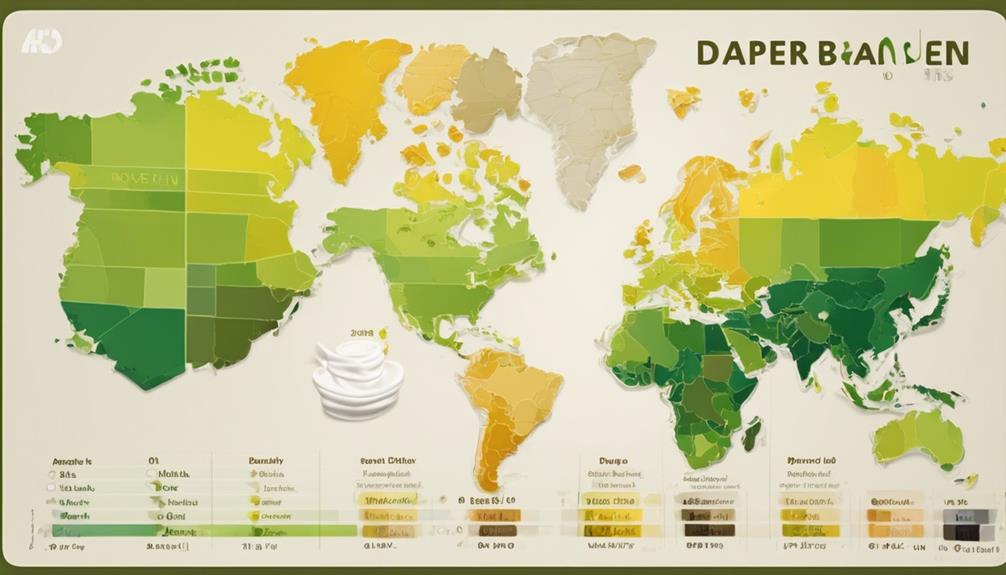Choosing between countertop and floor machines depends on your business’s cleaning needs. If you need quick, detailed cleaning for small surfaces or spaces with tight areas, a countertop machine is ideal. For large areas requiring deep, heavy-duty cleaning, a floor machine offers better efficiency and power. Consider your space, budget, and long-term durability. To discover which option suits your business best, explore the detailed differences and applications ahead.
Key Takeaways
- Choose countertop machines for detailed, small surface cleaning; opt for floor machines for large area, heavy-duty tasks.
- Consider budget and space: countertops are more affordable and compact, ideal for limited areas.
- Evaluate cleaning needs: floor machines provide deeper, more extensive cleaning for industrial or large commercial spaces.
- Assess user comfort and safety features; ergonomic designs benefit prolonged use for both machine types.
- Balance long-term value: durability, maintenance costs, and brand support influence which machine offers better ROI.
Overview of Countertop and Floor Machines

Countertop and floor machines are essential tools for maintaining cleanliness and hygiene in various settings. These machines boost cleaning efficiency by quickly removing dirt, grime, and bacteria from surfaces, saving you time and effort. Countertop machines are compact, designed for detailed cleaning of small surfaces like counters and sinks, ensuring thorough sanitation. Floor machines are larger and more powerful, suitable for extensive floor areas, providing deep cleaning results. Both types prioritize user safety, featuring ergonomic designs and safety features that prevent accidents during operation. By choosing the right machine, you can improve cleaning effectiveness while reducing risks for users. Understanding the different types of machines helps in selecting the most suitable option for your specific cleaning needs, whether for commercial or residential use. Being aware of modern toilet technology can also contribute to overall hygiene and efficiency in your cleaning routines. Additionally, adopting practices that focus on attention and safety can further enhance cleaning outcomes and worker well-being. Proper training on machine operation can maximize performance and minimize hazards, ensuring a safer working environment. Recognizing the importance of ergonomic design can help prevent fatigue and injuries during extended cleaning tasks.
Typical Applications and Use Cases

Countertop and floor machines are tailored to specific cleaning tasks across various settings. For example, countertops benefit from compact machines that excel at quick, thorough cleaning in restaurants and commercial kitchens, ensuring high sanitation standards. Floor machines are ideal for larger areas like warehouses, retail spaces, and industrial sites, offering cleaning versatility for sweeping, scrubbing, and polishing extensive surfaces. They handle heavy-duty tasks efficiently, helping maintain cleanliness and hygiene. Both types adapt to different environments, with countertop units perfect for detailed, spot cleaning, and floor machines suited for exhaustive, deep cleaning. Understanding these typical applications helps you choose the right equipment to meet your business’s cleaning needs while maintaining proper sanitation standards. Additionally, selecting the appropriate machine can enhance cleaning efficiency and ensure compliance with health standards, especially when considering environmental impact. Being aware of grocery store hours can aid in scheduling maintenance or restocking to minimize disruption and maintain operational flow, and understanding equipment durability can help in planning long-term investments. Furthermore, recognizing the cost benefits of each type can guide budget allocations and operational decisions.
Performance and Cleaning Capabilities

When evaluating cleaning performance, it’s important to recognize that countertop and floor machines are designed to excel in different areas. Countertop machines focus on precision and detail, offering high cleaning efficiency for small surfaces. Floor machines, on the other hand, are built for larger areas, providing powerful cleaning capabilities. To compare their performance:
- Floor machines deliver unmatched overall cleaning efficiency for extensive spaces.
- Countertop machines excel at removing stubborn stains and residue.
- User comfort is enhanced by ergonomic designs suited for prolonged use.
- Floor machines often feature adjustable speeds for different cleaning tasks.
- The choice between the two can also be influenced by their technology differences, affecting overall performance and suitability for specific cleaning needs. Understanding tuning options and modifications can further optimize their effectiveness for specialized tasks.
- Additionally, maintenance procedures are crucial for maintaining the longevity and optimal performance of both machine types, ensuring they remain effective over time. Regular preventive maintenance can help avoid costly repairs and extend the lifespan of the equipment.
- Both types prioritize user comfort, but their strengths lie in specific applications. Incorporating innovative features can enhance user experience and cleaning results. Your choice depends on whether you need detailed cleaning or large-scale efficiency, ensuring excellent performance for your business.
Cost and Investment Considerations

When choosing between countertop and floor machines, you need to consider the initial purchase costs and how they fit into your budget. Don’t forget to factor in ongoing maintenance and operational expenses, which can add up over time. Evaluating the long-term return on investment helps ensure you select the option that provides the best value for your needs. Additionally, understanding the benefits of different yoga practices can help you choose equipment that best supports your specific activity requirements. Taking into account the personality traits of your team can also influence the most suitable machine choice for your business environment. Moreover, considering the safety and comfort features of each machine type can further optimize your investment. Recognizing potential trust issues within your team can also impact equipment decisions, especially if the environment requires reliable and consistent performance. Incorporating ergonomic design features can further enhance user comfort and reduce fatigue during operation.
Initial Purchase Expenses
While the initial purchase cost varies between countertop and floor machines, understanding these expenses is essential for making an informed investment. The pricing comparison helps you evaluate value and long-term benefits. Keep in mind:
- Higher-priced machines often come from reputable brands with better durability and performance.
- Cheaper options might save upfront costs but could lead to higher replacement expenses.
- Brand reputation influences the reliability and warranty support you receive.
- Investing in quality ensures fewer breakdowns and less downtime, saving money over time.
- Considering AI-driven analytics can help predict maintenance needs and optimize equipment lifespan, enhancing overall value.
- Additionally, understanding cost categories helps in budgeting for both initial purchase and ongoing operational expenses.
- Implementing space and organization strategies can also impact the overall efficiency and cost-effectiveness of your cleaning equipment.
- Consulting asset division principles when acquiring equipment can ensure better long-term management and replacement planning.
Your choice depends on balancing initial expenses with expected lifespan and performance. While countertop machines tend to be less costly initially, floor machines might require a larger investment but offer greater versatility. Weigh these factors carefully before buying.
Maintenance and Operating Costs
Although initial purchase costs differ between countertop and floor machines, ongoing maintenance and operating expenses can substantially affect your total investment. Countertop machines typically require less maintenance, leading to lower upkeep costs, but their cleaning efficiency may demand more frequent or intensive use, increasing energy consumption. Floor machines, on the other hand, are built for heavy-duty cleaning, which can improve cleaning efficiency over large areas but may consume more energy and require more frequent repairs. Consider how energy-efficient models could reduce ongoing costs. Regular maintenance, such as replacing brushes or filters, impacts expenses for both types. Ultimately, understanding these operating costs helps you choose a machine that balances upfront investment with long-term affordability and performance.
Long-Term Return on Investment
Evaluating the long-term return on investment for countertop versus floor machines requires considering both initial costs and ongoing expenses. While upfront prices matter, factors like brand reputation and customer support greatly influence value over time. A reliable brand may cost more initially but offers better durability and fewer repairs, boosting your ROI. To make an informed decision, consider:
- The durability and lifespan of the machine
- Availability of parts and repairs
- Customer support quality
- Overall reputation of the brand
Investing in a well-supported machine can reduce downtime and maintenance costs, ensuring better long-term profitability. While initial costs are important, choosing a model backed by strong customer support and a reputable brand maximizes your return on investment over time.
Maintenance and Durability Factors

When choosing between countertop and floor machines, it’s important to contemplate how resistant they are to wear and tear. You’ll want equipment that’s easy to maintain and stands up over time without frequent repairs. Understanding their longevity helps you make a smart investment that lasts.
Wear and Tear Resistance
Wear and tear resistance is a key factor to contemplate when choosing between countertop and floor machines, as it directly impacts their longevity and ongoing maintenance. A machine’s abrasion resistance and surface durability determine how well it withstands daily use and harsh conditions. Generally, floor machines face more intense wear, making surface durability vital. Consider these points:
- Floor machines typically require higher abrasion resistance due to frequent contact with debris and heavy loads.
- Countertop machines usually encounter less surface wear but still need good abrasion resistance for longevity.
- Materials like hardened steel or composite surfaces provide better surface durability.
- Regularly evaluating wear levels helps prevent costly repairs and extends your equipment’s lifespan.
Choosing a machine with superior wear and tear resistance ensures your investment lasts longer and performs reliably over time.
Ease of Maintenance
Ease of maintenance plays a essential role in determining which machine suits your needs, as it affects ongoing operational costs and downtime. Countertop machines generally require simpler cleaning routines, making it easier to keep them in good shape with less effort. Floor machines, on the other hand, often involve more complex cleaning and servicing, especially when replacing parts like brushes or belts. Regularly cleaning and inspecting your equipment helps prevent breakdowns and extends its lifespan. When maintenance is straightforward, you spend less time on repairs and more on your core business activities. Consider how accessible parts are and how easy it is to perform routine tasks. Choosing a machine with simple maintenance routines ultimately saves you money and minimizes operational disruptions.
Longevity and Durability
Longevity and durability are essential factors to contemplate when choosing between countertop and floor machines, as they directly impact your investment’s lifespan. Your choice depends on how well the machine withstands daily use and environmental factors. Consider these points:
- Power source: Electric models often last longer with proper maintenance, while battery-powered options may require replacements sooner.
- Build quality: Heavy-duty construction materials extend the machine’s lifespan, especially for floor models exposed to frequent use.
- Environmental impact: Machines with eco-friendly features tend to have fewer parts that degrade quickly, enhancing durability.
- Maintenance needs: Regular upkeep reduces wear and tear, prolonging operational life regardless of type.
Space and Storage Requirements

When choosing between countertop and floor machines, considering their space and storage needs is essential. Countertop machines typically require less storage space, making them ideal if your area is limited. They offer better storage efficiency because they can often be stored on countertops or small cabinets, freeing up valuable floor space. Floor machines, on the other hand, are larger and demand more dedicated storage, which might impact your overall space optimization. If you have a compact workspace, a countertop model allows you to keep your area organized without sacrificing much space. However, floor machines may need dedicated storage rooms or large carts. So, assess your available space carefully to make sure your chosen equipment fits seamlessly into your business environment.
Making the Right Choice for Your Business

Choosing the right machine for your business depends on evaluating your specific needs, workflow, and budget. To make an informed decision, consider these factors:
- Cleaning efficiency: Will the machine handle daily demands or specialized tasks?
- Customer satisfaction: Will a cleaner environment boost your clients’ experience?
- Versatility: Does the machine work well on various surfaces or just one?
- Cost-effectiveness: Will the investment provide long-term value and reduce downtime?
Countertop machines excel in detailed cleaning, improving customer satisfaction in small spaces. Floor machines cover larger areas quickly, increasing efficiency. Assess your priorities to choose the best fit for your business’s cleaning needs and customer experience.
Frequently Asked Questions
Which Machine Is More Eco-Friendly for Commercial Cleaning?
You’re wondering which machine is more eco-friendly for commercial cleaning. Generally, machines that use eco-friendly materials and have lower energy consumption are better choices. Look for models with energy-efficient motors and made from sustainable materials to reduce your environmental impact. By selecting equipment that prioritizes energy savings and eco-conscious construction, you can clean effectively while supporting sustainability goals in your business.
How Do Noise Levels Compare Between Countertop and Floor Machines?
You might think floor machines are louder, but sound levels vary. In noise comparison, countertop machines typically operate quieter because they’re smaller and designed for light tasks, producing less noise. Floor machines, especially heavy-duty ones, tend to generate higher sound levels due to their powerful motors. So, if minimizing noise is essential, countertop models could be your better choice, offering quieter operation without sacrificing cleaning effectiveness.
Are There Specific Safety Features to Consider for Each Type?
When selecting equipment, consider safety features like slip hazard prevention and emergency shutoff systems. For countertop machines, look for non-slip mats or textured surfaces to prevent slips, while for floor machines, guarantee they have slip-resistant wheels and handles. Emergency shutoff features are vital for both, allowing you to quickly stop operation during emergencies. Prioritizing these safety features helps protect your staff and keeps your business compliant.
Can Both Machines Be Used on Delicate or Sensitive Surfaces?
It’s a coincidence that both countertop and floor machines can sometimes be used on delicate surfaces, but it’s essential to evaluate surface sensitivity and material compatibility first. You’ll want to check the machine’s specifications and test in a small, inconspicuous area. While some models are designed for sensitive surfaces, others may cause damage. Always prioritize understanding each machine’s capabilities to prevent harm to your delicate materials.
Which Machine Offers Better Versatility for Different Cleaning Tasks?
When considering versatility comparison and task adaptability, floor machines often take the lead because they handle a wide range of cleaning jobs, from sweeping to scrubbing large areas. Countertop machines excel in smaller, detailed tasks but lack the broad adaptability of floor models. If you need a machine that offers greater versatility for various cleaning tasks, a floor machine provides more flexibility and efficiency across different surfaces and environments.
Conclusion
Choosing between countertop and floor machines boils down to your needs, your space, and your budget. Evaluate performance, consider durability, and weigh costs to make the best decision. Invest wisely, maintain diligently, and select confidently. Your choice shapes your clean, professional environment—so choose the machine that aligns with your goals, supports your growth, and keeps your business shining. Make the right choice today for a cleaner, more efficient tomorrow.









